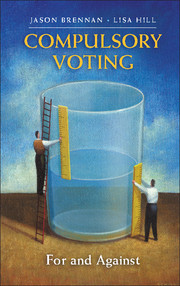3 - Do Your Share or Else
Published online by Cambridge University Press: 05 June 2014
Summary
Introduction
In Chapter 2, I examined arguments that claimed compulsory voting is justified because it would produce good consequences. None of these arguments was sound. So far the case for compulsory voting isn’t just weak – it’s practically nonexistent.
In this chapter, I focus instead on deontological arguments for compulsory voting. Some of these arguments try to establish that, for one reason or another, citizens have a duty to vote. The arguments then try to show that this justifies government in making them vote. Others argue that compulsory voting would in some way make citizens more autonomous or more efficacious. I argue none of these arguments succeeds in justifying compulsory voting.
Not All Moral Duties Are Enforceable
For the sake of argument, suppose citizens have a moral duty to vote. (Some people prefer to say we have a civic duty to vote, but that doesn’t change anything. It just specifies what kind of moral duty the duty to vote is supposed to be.) Now spot the flaw in the following argument:
The Duty-to-Vote Argument
Citizens have a moral duty to vote.
If citizens have a moral duty to do something, then government may force them to do it.
Therefore, government may force citizens to vote (i.e., compulsory voting is justified).
- Type
- Chapter
- Information
- Compulsory VotingFor and Against, pp. 62 - 82Publisher: Cambridge University PressPrint publication year: 2014



